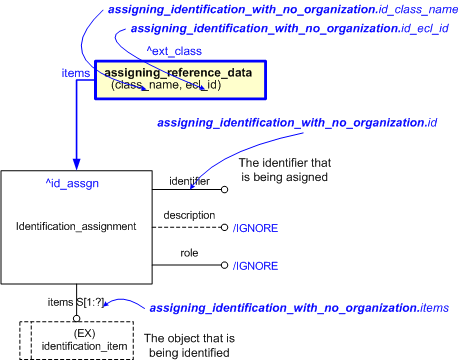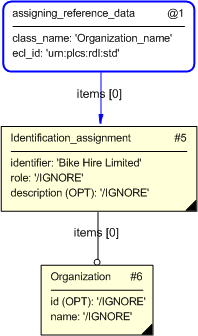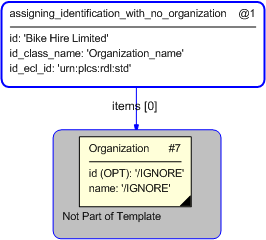| Template:— assigning_identification_with_no_organization (asg_noorg_id) |
Date: 2008/02/27 02:53:54
Revision: 1.18
|
This section specifies the template assigning_identification_with_no_organization.
NOTE
An explanation of a template and the associated instantiation path is
provided in the
Template overview
section.
This template describes the assignment of an identifier to an
object. The context of the
identifier is provided by classifying the assignment of the
identification. This template can be used to identify things where the organization that "owns" the identifier is not known,
or is not important.
The EXPRESS-G diagram in
Figure
1
shows the templates and EXPRESS entities that are required
to represent the template
"assigning_identification_with_no_organization".
The text highlighted in blue shows the template parameters.
Figure 1 —
An EXPRESS-G model for
assigning_identification_with_no_organization
The graphic for the template to be used in other EXPRESS-G diagrams
is shown in Figure
2
below.
Figure 2 — The graphical representation of the assigning_identification_with_no_organization template
The following input parameters are defined for this template:
The identifier that is being assigned.
The name of the class being used to classify the
identification
(
Identification_assignment).
This provides the role or reason for the identification. For example CAGE code.
The following classes and their sub-classes can be used:
id_ecl_id (Default=urn:plcs:rdl:std,Type='URN')
The identifier of the
External_class_library
storing the definition of the class referenced by the parameter @id_class_name.
The items being identified
The following reference parameters are defined for this template:
%^target = $assigning_identification_with_no_organization.id_assgn%
Allow the
External_class
entity instantiated in this path to be referenced when this template is used.
Note: The
External_class
entity can be referenced in a template path by:
%^target = $assigning_identification_with_no_organization.ext_class%
The following parameter combinations specify a uniqueness constraint:
Unique constraint: Unique identifier
There shall be at most one instance of the
entity
(
Identification_assignment)
within the data set uniquely identified
by a combination of the following parameters on this
template (assigning_identification_with_no_organization) namely:
id,
id_class_name,
id_ecl_id,
items.
The
instance is
referenced by the following template parameter:
id_assgn.
The instantiation path shown below specifies the entities that are to be
instantiated by the template.
-- Instantiate an Identification_assignment Identification_assignment-- Bind the Identification_assignment to the parameter ^id_assgn -- The parameter is a reference parameter so the -- Identification_assignment entity can be referred to when this -- template is used. %^id_assgn =
Identification_assignment%
-- Set the value of the identifier attribute to the value of the -- parameter @id - the identifier of the organization Identification_assignment.identifier =
@id-- Set the Identification_assignment attributes role and description -- to be ignored Identification_assignment.role = '/IGNORE'
Identification_assignment.description = '/IGNORE'
-- Assign the Identification_assignment.items to the instance -- of an Organization passed into the template through the -- @organization input parameter Identification_assignment.items ->
@items-- provide the role of the identification by classifying the Identification_assignment /
assigning_reference_data(
items=^id_assgn,
class_name=@id_class_name,
ecl_id=@id_ecl_id)/
-- The template assigning_reference_data has an external reference, ext_class, -- the external class that is being used in the classification. -- Bind this to the local external reference ext_class %^ext_class = $assigning_reference_data.ext_class%
The following entities are instantiated with attributes as specified:
The instance diagram in Figure
3
shows an example of the EXPRESS entities and templates that are instantiated by the template:
/assigning_identification_with_no_organization(items='#17', id='BikeHire Limited', id_class_name='Organization_name', id_ecl_id='urn:plcs:rdl:std')/
(an illustration of the consolidated assigning_identification_with_no_organization template is shown in
Figure
4 below.)
Note that the
assigning_reference_data
template is used in the diagram.
Namely:
/assigning_reference_data(items='#17', class_name='Organization_name', ecl_id='urn:plcs:rdl:std')/
Figure 3 — Instantiation of assigning_identification_with_no_organization
template entities
The instance diagram in
Figure
4
shows the graphic symbol for the template that is to be
used in other instance diagrams. The example template is:
/assigning_identification_with_no_organization(items='#17', id='BikeHire Limited', id_class_name='Organization_name', id_ecl_id='urn:plcs:rdl:std')/
Figure 4 — Instantiation of assigning_identification_with_no_organization template
Characterizations
No common characterizations of the template
assigning_identification_with_no_organization
have been identified. However, the ISO 10303-239 EXPRESS model
may enable other assignments to the entities instantiated by the template.




